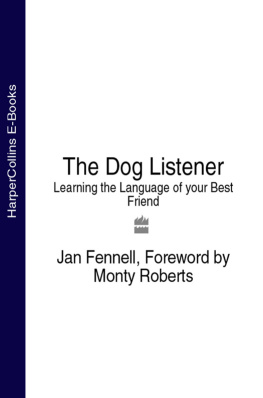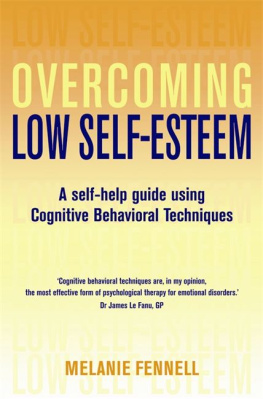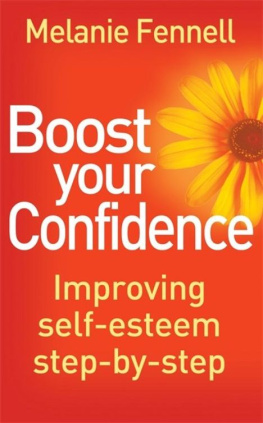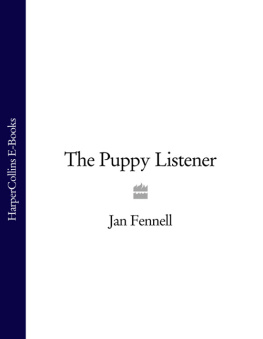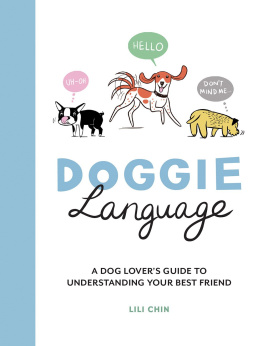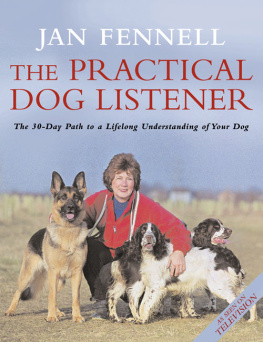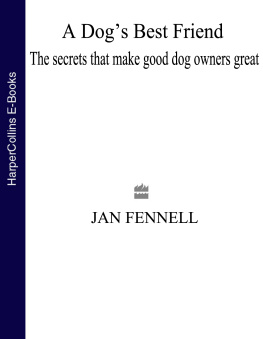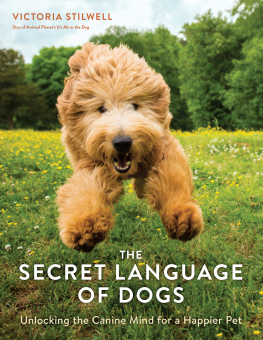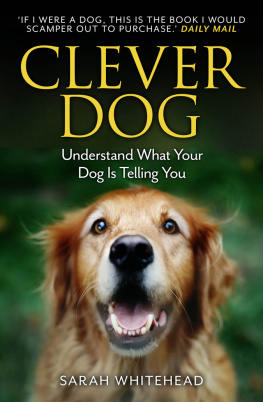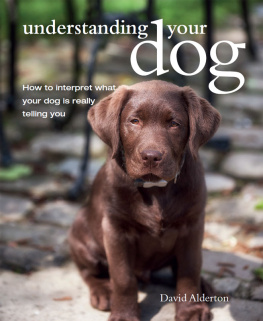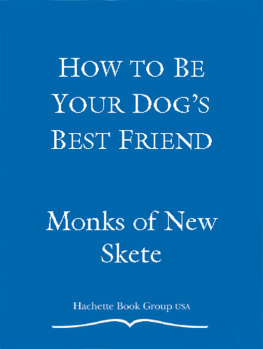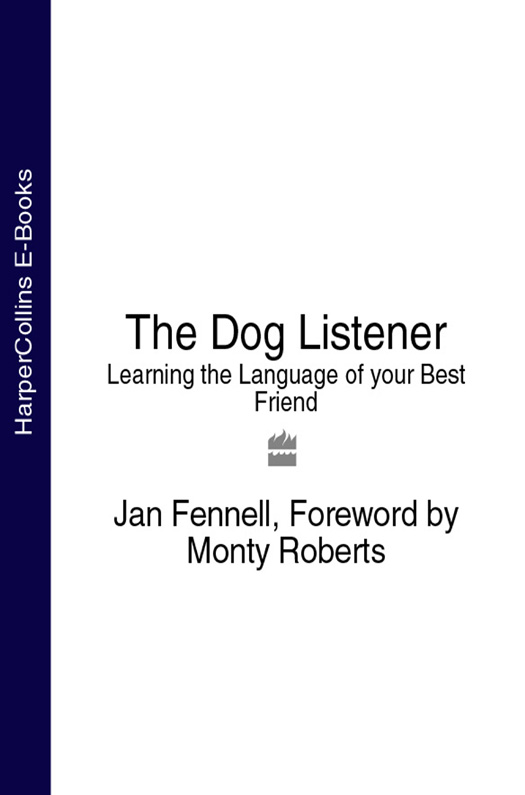Jan Fennells lifelong love affair with dogs began during her childhood in London and blossomed when she became a successful breeder, winning prizes at major shows including Crufts. In recent years, her remarkable work dealing with delinquent dogs and her frequent contributions to television and BBC radio programmes, have won her a wide and admiring audience. Jan, her partner, Glenn Miller, and their pack of show-winning Graftonbury English Springer Spaniels live in rural North Lincolnshire, England.
HarperCollinsPublishers
1 London Bridge Street,
London SE1 9GF
www.harpercollins.co.uk
First published in Great Britain by HarperCollinsPublishers 2000
Copyright Jan Fennell 2000 Foreword Monty Roberts 2000
Grateful acknowledgment is made to The National Trust for Places of Historic Interest or National Beauty, for permission to quote from the poem If by Rudyard Kipling.
Jan Fennell asserts the moral right to be identified as the author of this work
A catalogue record for this book is available from the British Library
All rights reserved under International and Pan-American Copyright Conventions. By payment of the required fees, you have been granted the nonexclusive, nontransferable right to access and read the text of this e-book on-screen. No part of this text may be reproduced, transmitted, downloaded, decompiled, reverse-engineered, or stored in or introduced into any information storage and retrieval system, in any form or by any means, whether electronic or mechanical, now known or hereinafter invented, without the express written permission of HarperCollins e-books.
HarperCollinsPublishers has made every reasonable effort to ensure that any picture content and written content in this ebook has been included or removed in accordance with the contractual and technological constraints in operation at the time of publication.
Source ISBN: 9780006532361
Ebook Edition JULY 2014 ISBN: 9780007369546
Version: 2018-08-02
For my son Tony
Contents
Caution
It is important to say here that my method cannot remove the aggressive tendencies of any dog. Certain breeds have been raised specifically for the purpose of fighting, and my methods will never be able to alter their potentially savage nature. What my method can do is allow people to manage their dogs so that this aggressive instinct is never called upon. Please exercise the greatest of caution when working with such dogs.
Dogs have played an important part in my life. My wife Pat and our family have had several over the years that were loving companions and important members of our family. It has been another wonderful creature that has dominated my career, however. I have spent my life developing and often defending the method I have discovered for communicating with the horse.
The appetite the dog world has for my ideas has been obvious throughout this time. Wherever I may be in the world, there are invariably four times as many dog owners and trainers as there are horse trainers at my demonstrations. Almost to a person, they have strong, positive comments to make about my method.
Given my time all over again, I would relish the challenge of adapting my ideas and taking them into the canine world. As it is though, I have more than enough to keep me occupied, developing and sharing my own discipline. Fortunately, in the last few years, I have become aware of a talented dog trainer who, inspired by my method, has undertaken the task already.
It was with a warm heart that I first learned of the work Jan Fennell has been doing in England. I have been lucky enough to meet her there and she has related much that reminds me of my own earlier experiences. Like me, Jan feels a deep sense of injustice at the way man has sometimes maltreated an animal he claims to call his friend. She also passionately believes that violence has no place in our relationship with animals. Her dream, too, is a world in which all species live in peace.
As with me, Jan has been slow to summon the courage to tell her story. I dragged my feet for years before I wrote my first book, The Man Who Listens to Horses. Jan has been just as careful in waiting to put her ideas into print. She now feels confident in her experience and is ready to share her remarkable work with a wider audience.
As she does so, I wish her and her ideas well. I am sure there will be those who will assail her. If my experience has taught me anything, it is that human nature has an almost limitless capacity for negativity. Each of us should be aware that for every grain of negative within the human community, there is a mountain of positive waiting for us among animals. We should also note that for every negative, however, there are literally hundreds thirsting for a better way to deal with mans best friends.
I am proud to think that by sticking to my beliefs I have helped make the world a better place for the horse and, hopefully, for people too. I hope this book can achieve the same for another very special creature, the dog.
Monty Roberts, California, March 2000.
I am a great believer in learning from the mistakes we make in life. I should be, I have made more than enough of my own, in my relations with humans as well as dogs. Of all the lessons the latter have taught me, none was as painful as that I received in the winter of 1972. It seems to me fitting that I should begin with the tragedy of Purdey. For reasons that will soon become apparent, her story is inseparable from my own.
At the time I was married and was raising my two young children, my daughter, Ellie, born that February, and Tony, then two-and-a-half. We were living as a family in London but had just decided to move to the countryside, and a small village in Lincolnshire, in the heart of England. Like so many people drawn to the rural life, we were all looking forward to going on long country walks and decided we would like a canine companion to take with us. Rather than buying a new puppy, we thought wed rescue a dog. We liked the idea of giving a home to an animal that had had a raw deal, so off we trundled to the RSPCA and saw this rather sweet, six-month-old, black and white, cross Border collie-whippet. We took her home, where we decided to call her Purdey.
She was not the first dog in my life. That had been Shane, a magnificent, tricoloured Border collie I had been given by my father when I was a 13-year-old girl growing up in Fulham, west London. I had always loved dogs and, as a little girl, had invented an imaginary one called Lady. I remember my grandmother indulging me by talking to my fictional friend with me. I think I saw dogs then, as I do now, as objects of unquestioning love, total loyalty, qualities that are hard to find in humans. Shanes arrival in our family had only confirmed my feelings.
I trained Shane with my father, according to the technique Dad had used himself in raising his dogs as a young boy. Dad was a gentle man, but he was also determined the dog was going to do what we said. If Shane did something wrong he got a tap on the nose or a smack on his bottom. But I got a smack on the bottom too and I thought it was OK, particularly as Shane was an extremely smart creature and seemed to understand what we wanted. I can still remember the pride I used to feel at taking him on to Putney Heath and Wimbledon Common on the Number 74 bus. Shane would sit by my side without a lead, behaving impeccably all the time. He was a super dog.

